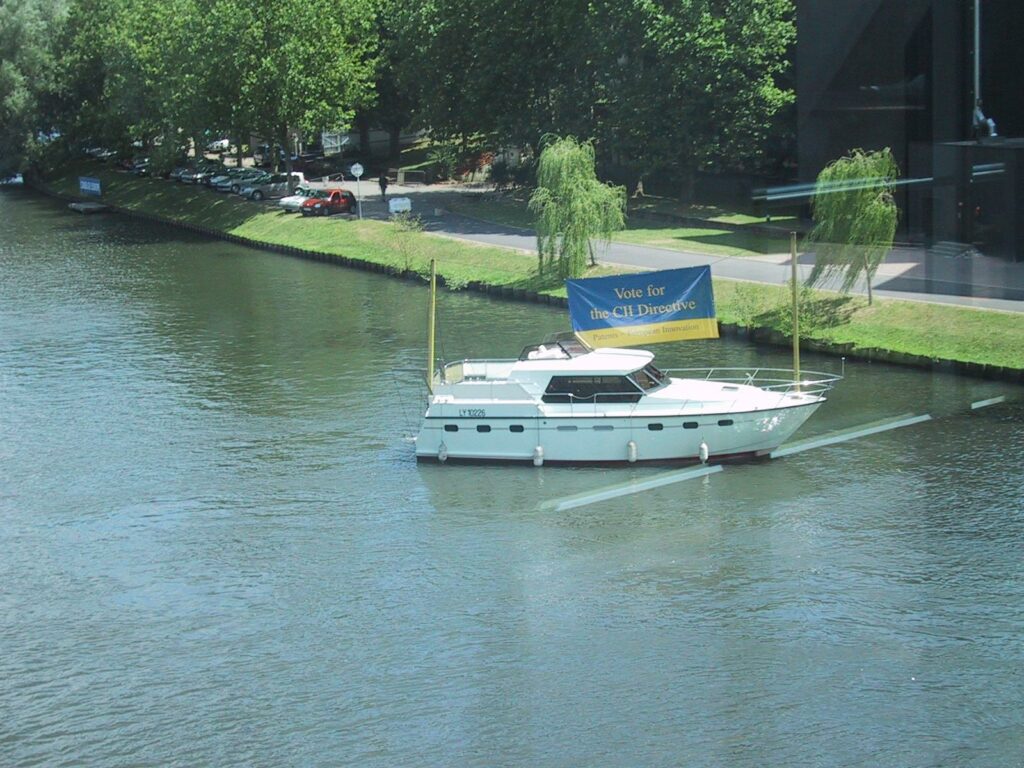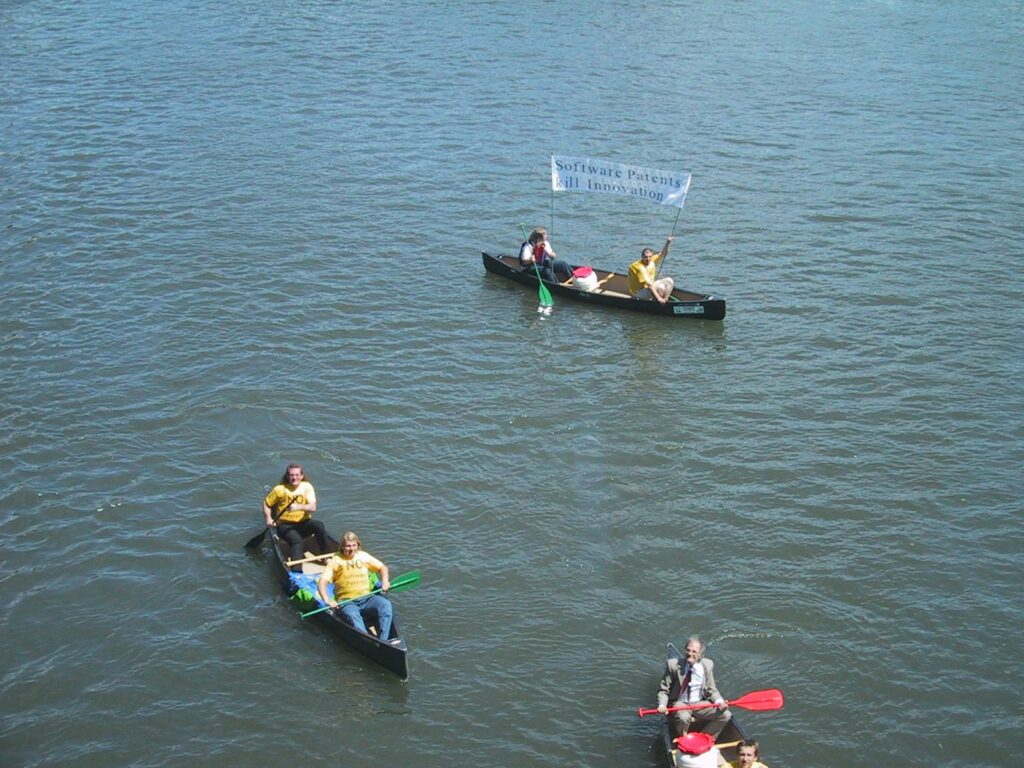

The first meeting between Michel Rocard and the free software communities took place on September 5, 2001, at a dinner organized in Strasbourg by Gilles Savary, one of his fellow MEPs from the Party of European Socialists (PES). This dinner was the starting point for his involvement in a long-term political battle, which he fought to a successful conclusion on July 6, 2005, when the European Parliament rejected on second reading the draft directive on the “patentability of computer-implemented inventions”.
Michel Rocard was no stranger to computers. He continued to put his ideas down on paper, in the brown ink of his fountain pen, each line shifting a little to the right of the previous one, leaving it to his assistants to format the digital version of his speeches. However, he was well aware of the scope of the digital revolution and the social and economic upheavals it was bringing about, having already given thought to these issues within the “Group of Ten” created by Jacques Robin [1]. His analytical way of thinking enabled him to approach each problem systemically, considering its causes, consequences and interrelations with the various components of society, without getting lost in technical meanderings. So, once he had weighed up the economic stakes and the industrial and sovereignty implications of the issue, he became fully involved.
Software patents and free/libre software
Historically, the modern patent systems established at the end of the 19th century were designed to perpetuate industrial knowledge that had previously been kept secret, by guaranteeing their holders a temporary monopoly of exploitation in return for disclosure of the processes claimed. In order to prevent the abusive extension of this system to intellectual methods, as had already occurred in France with the patent law of 1791, the perimeter of patentability was defined by the fact that, to constitute a patentable invention, an innovation had to make a contribution in a “technical” field, this last term implying “the controlled use of the forces of nature”. In other words, only innovative processes in the physical world could be claimed.
The emergence of the computer industry after the Second World War had several effects. Firstly, it led legislators to consider the legal protection to be afforded to software, a new kind of intangible asset. Because writing software is similar to writing a work (since both involve formalising a set of ideas and thought processes in a certain language), copyright was chosen for this purpose, as the patent system had already been deemed inadequate at the time. Secondly, it led to a number of innovative industrial mechanisms now incorporating computers to control them (ABS braking systems, automatic gearboxes, etc.), giving rise to a category of “computer-controlled” inventions. As a result, although the 1973 European Patent Convention (EPC), which is still in force, stipulates that computer programs (software) are not patentable, the prohibition on patentability only applies to software “as such”, and a computer-controlled invention should still be patentable provided that the “technical contribution” is indeed an innovative use of the “forces of nature”.
However, the major software manufacturers and patent offices were not satisfied with this balance: the former, because copyright, by protecting every piece of software created, did not allow them, much to their chagrin, to establish a monopoly of rights over an entire sector of activity; the latter, because all the revenues from the software industry escaped their trade (the main source of revenue for patent offices being the filing and renewal fees on the patents they issue).
Since the mid-1980s, the world’s major patent offices (in particular, the US Patent and Trademark Office, USPTO, and the European Patent Office, EPO) have been extending patentability to the intangible domain, through the decisions of their own “appelate chambers”. They coined the term “computer-implemented invention” (what a computer implements is software), and claimed that, for an innovation to be patentable, all that was required was a new contribution (such as new software) using “technical means” (such as a non-innovative computer). This deviant intellectual construction was, however, illegal. To legalize these practices a posteriori, after a revision of the EPC in their direction had narrowly failed in 2000, there remained the option of ad hoc European legislation. The European Commission, receptive to the voice of the lobbies, began to work in 2000, producing a study on “the economic impact of the patentability of computer programs”, prior to a draft directive, the first version of which was published in 2002.
In 2000, it produced a study on the “economic impact of the patentability of computer programs”, prior to a draft directive, the first version of which was published in 2002.
The main targets of software patents are SMEs, VSEs and individual developers, who do not have the means to defend themselves against abusive infringement lawsuits. Also in this category are developers of so-called “free” software, i.e. software distributed under licenses (based on copyright) who make the “source code” of their software available to third parties, thus openly exposing their algorithmic methods. Because “librists” have, since the very beginnings of the Internet, been accustomed to exchanging and collaborating worldwide, and are attentive to the legal aspects concerning software, the threat of software patents, already real in the United States, was well identified. So, as soon as the European Commission’s plans became known, a European collective of entrepreneurs and activists called “Eurolinux” was organized in 1999. It was later joined by a foundation dedicated to these issues, the FFII, more welcoming to SMEs whose business models were not based on free software licenses.
Michel Rocard at the heart of the parliamentary battle
It was following the first Libre Software Meeting (Rencontres mondiales du logiciel libre), organized in July 2000 in Bordeaux, that I joined the Eurolinux group. One of our first tasks was to alert European parliamentarians, and it was on this occasion that I got in touch with Gilles Savary, PSE MEP for the South-West region. At the time, Gilles Savary was a member of the European Parliament’s ITRE (Industry and Transport) Committee. Convinced by our arguments, he began to raise awareness within his committee and parliamentary group. However, noting the extent of the lobbying already undertaken by the promoters of software patentability, he called on the person who seemed most likely to be able to convince his peers if he himself was convinced: Michel Rocard. Hence the dinner in question [2] which brought together, in addition to Michel Rocard, Gilles Savary, and Harlem Désir, a number of activists including myself and Philippe Aigrain [3], who was working at the European Commission at the time. After we’d presented our arguments for around twenty minutes, he interrupted us to ask two synthetic questions, which showed that he’d immediately grasped the considerable stakes involved. He was interested, but not yet convinced. Nevertheless, in order to keep a firm grip on the issue, he referred it to the EP’s Culture Committee, which he was chairing at the time, for an opinion.
Michel Rocard was not a man to commit himself lightly, and loved the intellectual stimulation offered by new horizons. In this respect, he was hardly disappointed, discovering, in the course of his activism with the EP, a community of “librist” activists acting in an unconventional way, almost instantly flooding MEPs’ e-mail inboxes with substantiated counter-arguments to every statement made by the pro-patents, and sometimes in a highly undiplomatic manner [4]. Nevertheless, as a lover of culture and the sharing of knowledge, he was aware of the potential of a digital universe in which what was once conceived could be made freely accessible to all at low cost [5], and which these patents would destroy [6]. It was also a question of digital sovereignty: the legalization of these patents in Europe would give an anteriority advantage to the patents of U.S. companies, granting them a right of life and death over our entire software industry [7].
He carefully read the arguments of all sides, looking for the key ideas and logical flaws in each, in order to find, if possible, a compromise route that would satisfy all parties. Faced with the pro-patents who argued that, without patents, Europe would be at the mercy of the U.S., unable to protect its “inventions”, he pointed out the obvious: it didn’t matter that the U.S. had software patents and the EU didn’t. Patents are territorial instruments, which means that they can only be used on a territorial basis. Patents being territorial instruments, European companies would not be disadvantaged by the absence of such patents in Europe, knowing that they could very well obtain them in the U.S. if they so wished, the EU remaining a “safe zone” for its own SMEs. This argument finally won him over; the maneuvers of the pro-patents reinforced his conviction each time. Compromise was impossible, and the decision was made, so we had to stick it out.
The speech he gave at the meeting of the EP’s Legal Affairs Committee with Commissioner McCreevy on February 2, 2005 exposes the various maneuvers used by the pro-patents to try and achieve their ends, and exposes them to their own contradictions [8]. Michel Rocard liked neither vulgarity nor intimidation: faced with a Commissioner McCreevy who, during a private technical discussion, asked him, belching, whether he “wanted war”, he replied with phlegm and firmness that “he had already stopped two wars, but it wasn’t because he was a man of peace that he would give in to intimidation”, nipping his interlocutor in the bud [9].
In the end, the draft directive was rejected at second reading (a first in the history of the EU), on July 6, 2005, by an overwhelming 648 votes to 14, with 18 abstentions; the pro-patents also voted against the text, fearing subsequent amendments that might have explicitly forced the EPO to revise its practices, which continue unabated.
This parliamentary battle and the arguments exchanged advanced his thinking on economic models in the digital age, supporting Rifkin’s views on the access economy [10]. He came to see the capacity for informational exchange between contributors and communities as a way out of a capitalist system centered on rents and scarcity, and free licenses as legal vectors for a model of social organization to be favored [4]. Here he found the possibility of implementing the socialist and self-management ideals he had embraced from the start of his career, and which he has always defended.
References
- Wikipedia, « Jacques Robin (médecin) », https://fr.wikipedia.org/wiki/Jacques_Robin_(m%C3%A9decin)
- Gilles Savary, « Hommage à Michel Rocard », blog Inventer à gauche, 14 September 2016, http://www.inventeragauche.com/non-classe/hommage-a-michel-rocard-par-gilles-savary/ (the date of the dinner mentioned in the article is incorrect)
- Philippe Aigrain, Sharing, Culture and the Economy in the Internet Age, University of Amsterdam Press, 2011, https://paigrain.debatpublic.net/?page_id=3968
- Michel Rocard, Preface of Droit des Logiciels – Logiciels privatifs et logiciels libres by François Pellegrini and Sébastien Canévet, Puf, November 2013, pp. 7-15, https://www.puf.com/sites/default/files/Droit%20des%20logiciels.pdf
- Florent Latrive and Laurent Mauriac, « Michel Rocard : Tout le monde se copie et c’est bien ainsi », Libération, 30 June 2003, https://www.liberation.fr/futurs/2003/06/30/tout-le-monde-se-copie-et-c-est-bien-ainsi_438265/
- Perline and Thierry Noisette, La bataille du logiciel libre, La Découverte, 2004, pp. 90–105
- Michel Rocard, Introductory speech to the second reading vote at the European Parliament, 5 July 2005, https://www.europarl.europa.eu/doceo/document/CRE-6-2005-07-05-ITM-006_EN.html
- Michel Rocard, Speech delivered at the meeting of the Committee on Legal Affairs of the European Parliament (JURI) with Commissionner McCreevy, 2 February 2005, https://archive.framalibre.org/article3575.html (audio recording available here: https://archive.framalibre.org/IMG/rocard1.ogg)
- Thierry Noisette, « Michel Rocard, héros victorieux de la lutte contre les brevets logiciels », https://www.zdnet.fr/blogs/l-esprit-libre/michel-rocard-heros-victorieux-de-la-lutte-contre-les-brevets-logiciels-39839198.htm
- Jeremy Rifkin, The age of access, March 2001
[The French version of this article appeared in issue 35, September 2021 of Convictions, the newsletter of the MichelRocard.org association, pp. 5-8]
